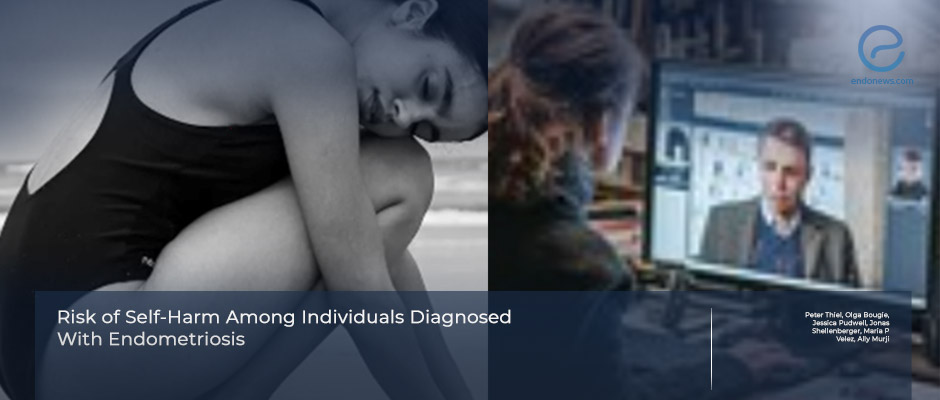Hidden Pain: Increased Self-Harm Risk in Endometriosis
Oct 23, 2025
Chronic Inflammation, Chronic Distress: Uncovering the Mental Health Consequences of Endometriosis
Key Points
Highlights:
- Mental health evaluation is essential for patients newly diagnosed with endometriosis, particularly those without previous psychiatric care.
- Patients with endometriosis show higher rates of self-harm, overdose, and suicide compared with individuals without the disease.
Importance:
- Robust evidence from this study reveals that endometriosis is independently associated with an elevated risk of self-harm and related behaviors, underscoring the importance of integrating mental health assessment and support into endometriosis care.
What’s done here?
- This is a population-based, retrospective, matched cohort study usingOntario administrative health data (2010–2022).
- The cohort included 56,053 patients with endometriosis and 112,106 individuals in a matched controls.
- The primary outcome was a composite of intentional self-harm, overdose, and suicide, adjusted for age, psychiatric utilization, and comorbidities.
Key results:
- The cumulative incidence of the primary composite outcome was 2.5% in endometriosis patients vs 1.8% in controls.
- Endometriosis was associated with a significantly higher adjusted risk of the composite outcome.
- The association was strongest in patients with no or minimal prior psychiatric care.
- Secondary analyses confirmed increased risks of intentional self-harm and overdose among patients with endometriosis.
Strenghts and Limitations:
- Strengthths are the use of comprehensive single-payer health-care data capturing all patients regardless of insurance status.
- Limitations: Administrative data may include diagnostic misclassification and lack clinical detail (e.g., disease severity, treatment history, or diagnostic delay).
From the Editor-in-Chief – EndoNews
"This study offers important, objective evidence of the psychological dimension of endometriosis, reinforcing the view that chronic inflammatory and pain conditions can affect both physical and mental well-being. The authors’ use of comprehensive, population-level data strengthens the credibility of their findings and avoids common biases found in smaller clinical studies.
The observed 42% increased risk of self-harm and related outcomes among individuals with endometriosis — especially those without prior psychiatric care — suggests that diagnosis itself may represent a critical window for mental health screening. Rather than implying causality, these results highlight the complex interplay between chronic pain, inflammation, and emotional distress, mediated by both biological and social factors.
From a clinical perspective, the study advocates for multidisciplinary care pathways, in which mental health evaluation is integrated into gynecologic and pain management practices from the outset. Such an approach may improve not only psychological outcomes but also overall treatment adherence and quality of life.
The message is clear: managing endometriosis effectively requires recognizing that mental health is not secondary — it is central to patient well-being."
Lay Summary
Endometriosis challenges both the body and the mind, revealing how chronic inflammation, pain, and delayed recognition can intersect to shape mental health outcomes. Increasing evidence suggests that the biological mechanisms underlying the disease—particularly immune activation and persistent pain signaling—may heighten psychological vulnerability, even in individuals without prior psychiatric history.
In a large population-based study published in Obstetrics & Gynecology, Thiel and colleagues from Ontario, Canada, investigated whether individuals with endometriosis face an increased risk of self-harm and related behaviors. Using administrative health data collected between 2010 and 2022, the team compared 56,053 patients with endometriosis to 112,106 matched controls.
The researchers found that those diagnosed with endometriosis had a 42% higher risk of a composite outcome that included intentional self-harm, overdose, and suicide. Notably, this elevated risk was most evident among individuals with no or minimal prior psychiatric care, suggesting that the psychological consequences of chronic disease may emerge independently of pre-existing mental health conditions.
Interestingly, when the data were stratified by psychiatric history, the relative risk was highest among those without prior engagement with mental health services. This finding implies that diagnosis itself—along with the complex psychosocial burden of chronic pain and uncertainty—may represent a critical moment for early mental health screening and intervention.
The study also highlights the broader biological and behavioral connections between inflammation, nociceptive pathways, and emotional regulation, reinforcing the concept that endometriosis should be viewed not only as a gynecologic disorder but as a systemic condition with neuropsychological dimensions.
As the authors concluded, “...findings underscore the heterogeneity of self-harm risk in endometriosis and point to the importance of considering mental health needs early in endometriosis care.”
Research Source: https://pubmed.ncbi.nlm.nih.gov/40811815/
endometriosis mental health intentional self-harm overdose suicide

